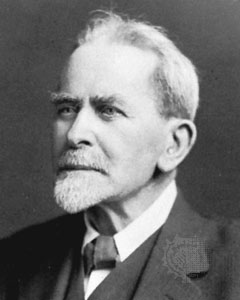Frazer, James George

Bio: (1854–1942) British anthropologist and ethnologist. James Frazer went to Glasgow University, and later studied law and classical literature at Trinity College, Cambridge, in 1874. After attaining a doctorate he went to teach at Cambridge, where he stayed all his working life, apart for one year being chair of sociology and anthropology at Liverpool University. Frazer was elected a member of the British Academy in 1902.
His theoretical and methodological approach to anthropology was influenced by theorists of socio-cultural evolution such as Auguste Comte, Herbert Spencer, Edward B. Tylor, and William Robertson Smith. Frazer used a comparative and evolutionist approach to all the data he gathered. Frazer's favorite topics of research were religion, magic, myth, and folklore. In the book Totemism and Exogamy 4 vols. (1887) he argues that primitive people lacked the knowledge of biological reproduction and attributed births to totems, which led to the rules of exogamy and matriarchal and patriarchal family structures. Unlike his intellectual predecessor Tylor, Frazer doesn’t treat the couvade (custom where a man is performing ritualistic “labor” of a child in public, while his wife is giving birth for real outside public view) in terms of agnatic rights over children, but in as manifestation of the principles of homeopathic and contagious magic. These two types of magic are the product of two intellectual laws: the law of similarity (the specific thing that happens to an object or a person is going to happen in the same way to a person or an object that is magically connected to the first one) and the law of contagion or contact (parts that once made a whole will stay magically connected even after the separation).
The same year the Totemism was published Frazer prepared the questionnaire to be used by ethnologists in the field in order to produce systematic and comparable sets of data for Frazer to analyze. The product of this cooperation with the field ethnologists (Frazer never did any fieldwork) was Frazer’s most influential and famous book The Golden Bough: A Study of Comparative Religion (1st ed. 2 vols.1890). The main subject of the book is myths of Aryan divine priest-kings who are sacrificed when they get old to reinvigorate life and bring fertility to nature. Frazer adopts Comte’s classification of three evolutionary stages. In the first magical stage, people believe that they can control nature through magic and empathy (that is the stage where they sacrifice kings). In the next religious stage, a scapegoat is sacrificed instead of the king himself, not as a direct magical ritual, but as an offering to gods who are supposed to bless the people and show mercy. In the final stage of civilization, people separate their life into areas that are ruled by science and those ruled by religion. Frazer used Tylor’s theory of survivals to show that farmers and other less educated populations in Europe in his time still used practices found in primitive religion and magic.
In the book Folklore in the Old Testament (1918), Frazer analyzes the Old Testament from the comparative perspective of folklore and myths of cultures all over the world.
Fields of research
Anthropology Christianity Civilization Culture Customs, Social Death Diffusion Evolution Kinship Magic Matriarchy Monarchy Myth Patriarchy Religion Taboo TraditionTheoretical approaches
EvolutionismMain works
Totemism and Exogamy 4 vols. (1887);
The Golden Bough: A Study of Comparative Religion ( 1th ed. 2 vols.1890, 2th ed. 3 vols. 1900, 3th ed. 13 vols. 1906-1915, abridged ed. 1922);
Folklore in the Old Testament (1918).

